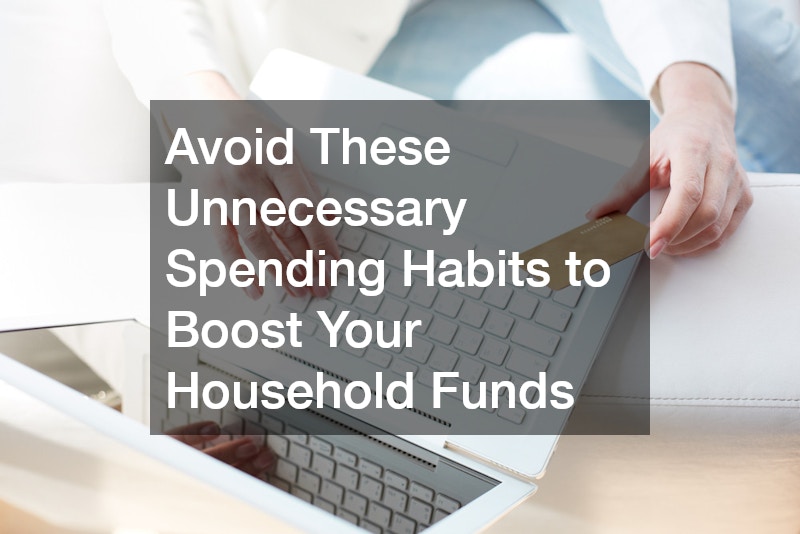In today’s consumer-driven world, many individuals often find themselves indulging in lavish purchases or engaging in habits that offer little long-term benefit. While it’s easy to justify spending on what appears to be a fleeting need or desire, there are countless areas where unnecessary spending can take a toll on finances. This article explores a variety of common indulgences that may not be as essential as they seem, from extravagant home remodeling projects to frequent salon visits. By highlighting these areas, the goal is to shed light on how habits that seem harmless in the moment can ultimately lead to a drain on personal finances.
Extravagant Remodeling Projects

Kitchen renovations are among the most common remodeling projects that homeowners take on, but they can quickly spiral into a major expense. While upgrading kitchen countertops with high-end materials like marble or granite can certainly enhance the aesthetic appeal of a kitchen, they might not be as necessary as many believe. In some cases, a countertop upgrade can cost thousands of dollars—money that could be better spent elsewhere or saved for future needs. For those who don’t entertain often or use their kitchen in ways that require premium surfaces, a more affordable alternative could still achieve a stylish result without the hefty price tag.
Unnecessary Spending
When it comes to kitchen remodels, some elements of the renovation may simply be unnecessary. For example, investing in top-tier appliances or expensive lighting fixtures might seem like a good idea at the time, but it often leads to spending money that doesn’t significantly improve the functionality or enjoyment of the space. Sometimes, basic updates like repainting cabinets or installing less expensive hardware can provide a fresh, updated look without the hefty costs of a full remodel. By carefully assessing what aspects of a renovation truly enhance daily life, homeowners can avoid falling into the trap of overspending on luxury items that are ultimately not essential.
Frequent Outings
Dining out at upscale barbeque restaurants can be an enjoyable experience, but for many, it becomes an indulgence that adds up over time. While the experience of enjoying a high-quality meal with friends or family is certainly pleasurable, frequent visits to expensive barbeque joints can lead to unnecessary spending. Dining out regularly at such establishments might make you feel good in the moment, but the costs can quickly accumulate, and in the long run, it’s more economical to cook at home. Preparing a delicious barbeque meal yourself not only saves money but also offers a sense of accomplishment and can bring families closer together.
Unnecessary Spending
Frequent outings to expensive restaurants, whether for barbeque or other cuisines, often become an emotional expenditure. It’s easy to justify treating oneself after a busy week or celebrating special occasions at high-end places. However, the reality is that dining out multiple times a week can be an unnecessary drain on your budget. Many people find themselves spending money on meals that are far more expensive than cooking at home, and the experience, while enjoyable, doesn’t always provide lasting satisfaction. It’s crucial to evaluate whether these outings are enhancing your life or simply satisfying a temporary craving.
New Vehicles
Purchasing a new vehicle, especially something like a luxury boat from a boat dealer, is often viewed as a status symbol or an ultimate reward for hard work. While having a new vehicle can offer comfort, luxury, and convenience, it’s also a significant financial commitment. Buying a brand-new boat can cost tens of thousands of dollars, and that’s without accounting for maintenance, insurance, and storage costs. For many, this kind of purchase can lead to unnecessary spending that strains personal finances. A boat is a recreational vehicle that, while enjoyable, isn’t something used daily, making the hefty cost questionable for many buyers.
Unnecessary Spending
The allure of a brand-new boat, complete with all the bells and whistles, can make it seem like a wise investment for leisurely weekends. However, many individuals find themselves overspending on a vehicle that they only use sparingly. In reality, the costs associated with owning such a vehicle can quickly add up, from monthly payments to regular upkeep and storage fees. For those who don’t frequent the water enough to justify such a purchase, it’s an example of unnecessary spending that could be better allocated toward other financial goals or long-term savings.
The Latest Tech

Electric bikes, or e-bikes, have gained popularity in recent years as a convenient mode of transportation, combining the benefits of cycling with a motorized boost. However, while they may seem like a smart investment for people looking to reduce their carbon footprint or save on gas, e-bikes come with a significant upfront cost. Depending on the model, an e-bike can cost several thousand dollars, and it’s important to consider whether this expense is truly necessary. While e-bikes may offer some practical benefits, the price point might make them an extravagant purchase for those who could rely on traditional cycling, public transport, or even walking for daily commutes.
Unnecessary Spending
While e-bikes are marketed as a modern, eco-friendly solution for transportation, they may not be the best choice for everyone. Many people find themselves tempted to purchase the latest tech gadget, convinced that it will improve their daily life. However, the high costs associated with thes e bikes, combined with potential repair and maintenance needs, can quickly make them an unnecessary expenditure. It’s important to question whether the e-bike will truly enhance your lifestyle or if it’s simply another purchase driven by novelty and marketing. In some cases, investing in simpler alternatives, like a regular bike or improved walking gear, may offer more value in the long run.
Impulse Shopping
Impulse shopping is a behavior that many people struggle to control, and it can manifest in a variety of ways. For some, it might mean making unplanned purchases at a gun store. Firearms, while important for some individuals’ personal safety or hobbies, are a costly investment. Purchasing guns without careful consideration of their need or purpose can lead to unnecessary spending, especially when impulse purchases are motivated by temporary emotions or outside influences.
Unnecessary Spending
Impulse purchases at gun stores can quickly lead to regret, especially when the item purchased isn’t truly needed. Often, people will buy things on a whim without fully considering their budget or long-term plans. This tendency can lead to the acquisition of unnecessary firearms that only add to the financial burden. By recognizing the emotional triggers that lead to impulse buying, individuals can make more informed decisions and avoid spending money on items that do not enhance their lives or security.
Retail Therapy
Retail therapy, which involves making purchases to relieve stress or boost mood, is a common response to life’s pressures. For some, this may involve visiting a vape shop. While vaping is often marketed as a safer alternative to smoking, it still carries health risks and can lead to unnecessary spending. The price of vape pens, e-liquids, and accessories can add up over time, especially for those who frequently purchase new products or flavors. Additionally, the addictive nature of vaping can create a cycle of ongoing costs that are difficult to break.
Unnecessary Spending
For those seeking comfort or relaxation through retail therapy, the act of purchasing vaping products can become a routine that drains finances. Whether it’s trying new flavors or upgrading to the latest vape tech, each trip to the shop adds to a growing expense that isn’t necessarily benefiting one’s overall well-being. Retail therapy often provides short-term relief but fails to address the deeper issues that might be causing the desire to spend. By reflecting on the underlying causes of impulsive spending, individuals can identify healthier ways to manage their emotions without resorting to unnecessary purchases.
Frequent Salon Visits

Many people treat hair salon visits as a luxury, but the costs can quickly add up over time. Regular haircuts, coloring, and treatments can amount to hundreds or even thousands of dollars annually. While it’s understandable to want to maintain a polished appearance, frequent visits to high-end salons might not be the best use of your budget. Many individuals opt for salon treatments because they believe it improves their self-esteem or social image, but often the cost far outweighs the benefits. For those who don’t have the time or resources to visit the salon regularly, a more manageable approach, such as learning basic hair care techniques or finding affordable alternatives, could be just as effective.
Unnecessary Spending
When it comes to salon visits, the line between self-care and unnecessary spending can often blur. While maintaining personal grooming is important, regular salon treatments can become an indulgence that doesn’t provide enough value to justify the cost. The frequency of these visits can easily become a habit that feels necessary, but in reality, many of these expenses are not essential. Instead of constantly scheduling salon appointments, individuals can explore cost-effective haircare options that are just as effective. By adopting a more practical approach, you can maintain your appearance without sacrificing your financial health.
Luxury Travel
Luxury travel is a common aspiration, with many individuals dreaming of staying in five-star beach hotels or resorts. While these experiences can be memorable and enjoyable, the costs associated with such vacations can be astronomical. A luxury hotel stay, complete with fine dining and spa services, can easily surpass the budget of a typical vacation. Although the allure of indulgent escapes is tempting, the value they offer may not always be worth the high price tag. Many travelers find that they can enjoy a similar experience by opting for more affordable accommodations, or by traveling during off-peak seasons to secure better rates.
Unnecessary Spending
Luxury travel can easily become a source of unnecessary spending, especially for those who frequently book expensive beach resorts or other lavish getaways. While these trips can provide a temporary escape from everyday stresses, the associated costs often outweigh the benefits. People often prioritize luxury accommodations and experiences without fully considering more affordable alternatives that could offer similar enjoyment. By reevaluating the need for extravagant vacations, individuals can make smarter travel choices that allow them to enjoy leisure time without breaking the bank.
Wasting Utilities
High energy bills are often a sign that HVAC systems are not functioning efficiently. Many homeowners overlook the need for regular maintenance, leading to wasted energy and inflated costs. Whether it’s a heating or cooling system, poor performance can cause your utility bills to skyrocket. In some cases, simple repairs or an energy-efficient upgrade can make a significant difference in how much you spend on utilities. Neglecting the efficiency of your HVAC system is a form of unnecessary spending that could be easily avoided by scheduling routine inspections and investing in energy-saving solutions.
Unnecessary Spending
Wasting utilities by not optimizing your HVAC system is a classic example of unnecessary spending. While regular maintenance might seem like an extra expense, it can save you significantly in the long run by ensuring that your system operates efficiently. Ignoring HVAC services can lead to higher energy consumption, causing you to waste money on unnecessary utility costs. Instead of paying for energy inefficiencies, invest in regular system check-ups and consider upgrading to energy-efficient models to help reduce overall spending.
Buying Bottled Water

Buying bottled water regularly may seem convenient, but it’s an expensive habit that many people fall into. The cost of purchasing bottled water over time can add up quickly, especially when alternatives, such as water purification systems, are available. Investing in a water filter or a purification system for your home is a one-time expense that can save you hundreds of dollars annually. Plus, it’s more environmentally friendly, as it reduces plastic waste. There are many affordable water filtration options that can provide clean and safe drinking water, making bottled water an unnecessary expense for most households.
Unnecessary Spending
While bottled water may seem like a convenient option, it’s an example of unnecessary spending that can easily be avoided. The cost of purchasing bottled water regularly can add up to significant amounts over time, without offering any added benefit over filtered tap water. By switching to a water purification system, individuals can save money, reduce waste, and ensure they always have clean, accessible drinking water. Recognizing that bottled water is a luxury rather than a necessity can help individuals make more informed choices about their spending habits.
In conclusion, unnecessary spending is a pervasive issue in modern society, often driven by trends, emotional impulses, or a desire for instant gratification. Whether it’s upgrading home features, indulging in frequent outings, or splurging on the latest gadgets, many people engage in financial behaviors that, while enjoyable in the short term, may not offer lasting value. It’s important to assess whether these purchases truly contribute to a fulfilling life or if they are simply serving as temporary distractions.

